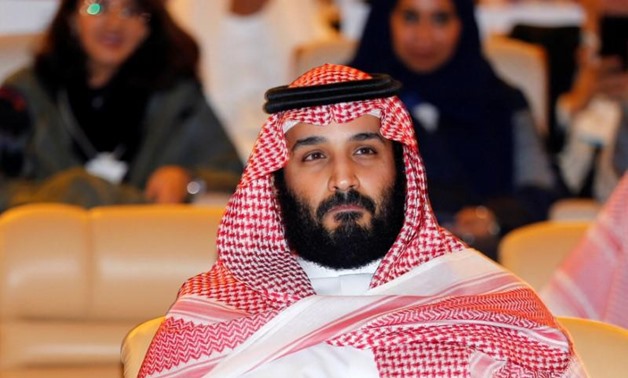
Saudi Crown Prince Mohammed bin Salman attends the Future Investment Initiative conference in Riyadh, Saudi Arabia October 24, 2017. REUTERS
CAIRO - 1 January 2018: Saudi Arabia has launched an unprecedented anti-corruption purge that included detaining royal family members, senior officials, prominent billionaires and businessmen, among them investment tycoons like Alwaleed bin Talal and Sheikh Saleh Kamel, two of the Kingdom’s top investors in Egypt.
The purge aroused concerns over the repercussions of the move on these moguls’ investments in Egypt at a time when the economy is thirsty for foreign direct investment (FDI) to bolster the economy and create jobs.
Saudi Arabia is ranked as the second-largest Arab investor in Egypt, with around 4,309 Saudi companies operating in Egypt and capital inflows worth a total of $7.218 billion, according to data from the General Authority for Investment and Free Zones (GAFI).
“The Saudi anti-corruption purge is not expected to harm the Egyptian economy as they are focused on the tourism and real estate sectors, not the industrial projects,” Head of Research at Pharos Holding Radwa El Sweify tells Business Today Egypt.
The official stance of the Egyptian state came in support of the Saudi regime’s sweeping crackdown, which tightens King Salman’s and his son Crown Prince Mohammad bin Salman’s grip on power.
During King Salman’s official visit to Cairo in April 2016, Cairo and Riyadh signed an agreement to establish a $16 billion joint investment fund, in addition to loan agreements worth a total of $25 billion.
In the domestic market, there are 854 Saudi companies working in the industrial sector, 784 in construction, 322 in tourism, 111 in the financial sector, 490 in agriculture, 1,366 in services and 382 in communications and information technology.
The Central Bank of Egypt (CBE) has not taken any measures to freeze the accounts of the detained Saudi businessmen, and the Egyptian Stock Exchange has also not suspended their shares or banned them from trading as the government has not officially received any requests from the Kingdom in this regard.
Under a legal agreement between Cairo and Riyadh, Egypt’s banking sector is committed to immediately freezing the accounts of these clients if legal judgments are issued against them.
In August, Prince Alwaleed bin Talal, the owner of investment firm Kingdom Holding, pledged new investments in Egypt’s hospitality sector as he announced a cooperation deal with Talaat Mostafa Group Holding (TMG) to inject $800 million in the expansion of the Four Seasons Resort Sharm El-Sheikh—making it the largest hotel in the world. The joint investments will also include the establishment of two new hotels in Madinaty and Al-Alamein.
Bin Talal, whose wealth is estimated at $18.7 billion, is accused of money laundering, bribery and extorting officials. In a short statement to the EGX, TMG denied that any stakes in the company are owned by bin Talal or his company Kingdom Holding Company.
TMG clarified that a total amount of $213 million has been invested so far into expanding the Four Seasons Resort Sharm El-Sheikh project, which the company is working on jointly with the Saudi prince. “Another $170 million is yet to be directed to the project, and will be financed by the company,” TMG added.
Sheikh Saleh Kamel, owner of the media conglomerate the Arab Radio and Television (ART) network who was arrested along with his sons, is one of the most prominent Saudi investors in Egypt. He owns shares in a number of businesses in Egypt, including Al-Baraka Bank, Ismailia Misr Poultry and Arab Moltaka Investment.
Al-Baraka Bank Egypt clarified in a statement to the EGX that it had no direct ties with Kamel, although he owns a personal stake in the bank, adding that he was not a board member and therefore had no influence over its operations.
Ismalia Misr Poultry and Arab Moltaka Investment both also said in separate statements to the EGX that they had no information about the arrest of Kamel and that their management were separate from its shareholders. The two companies affirmed that their businesses were operating as usual.
Escalating regional tensions, particularly between Saudi Arabia and Iran, are expected to push oil prices above the estimated average in Egypt’s budget for fiscal year 2017/18, yet it will have a positive impact on exports of petrochemicals and fertilizers.
Following the Saudi and Gulf markets, the EGX lost ground for three consecutive sessions, before rebounding from a limited short-term slide in reaction to the sweeping arrests.
“The recent increase in oil prices would probably force the government to speed up fuel subsidies’ cut, despite official pledges that further cuts are not on the cards before the current fiscal year end,” El Sweify says.
As per its $12 billion, three-year loan agreement with the International Monetary Fund (IMF), Egypt is committed to slash energy subsidies gradually as part of its macroeconomic reform program.
“With Egypt close to conducting a presidential election by June, I ruled out this possibility for political reasons,” she says, adding that the government is considering other alternatives to offset the oil price hike, including raising the prices of some public services, widening the tax base and improving the tax collection efficiency.


Comments
Leave a Comment